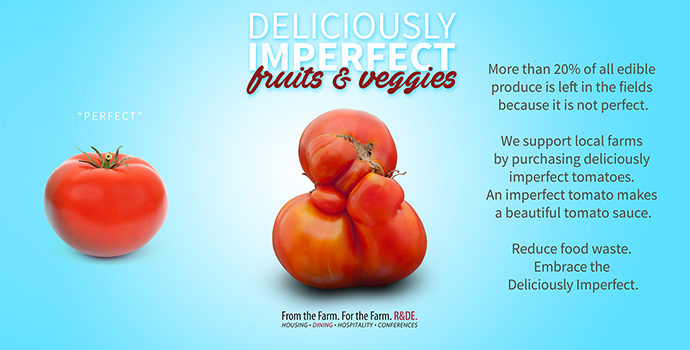
R&DE Continues Commitment to Sustainability
Each year, Residential & Dining Enterprises (R&DE) Stanford Dining expands its sustainable food commitments. Local, organic, humane, and fair food now make up close to half of R&DE’s food purchases. R&DE Stanford Dining is also proud to have reduced its water use by 23% from a 2013 baseline in response to the drought. In 2015-16, the following new initiatives contributed to these efforts:
Organic produce from the O’Donohue Family Stanford Educational Farm: R&DE and the O’Donohue Family Stanford Educational Farm started a farm-to-campus program bringing fresh, local, and organic produce to the dining halls. Over the course of the year, the farm harvested over 10,000 pounds of produce, most of it destined for the dining halls, Stanford Catering, and Forbes Family Café. In addition to buying produce from the farm, R&DE Stanford Dining sent used coffee grounds to the farm for compost and mulch.
Deliciously imperfect organic produce from Coke Farm: According to reports, 20%-30% of fruits and vegetables are not picked or are plowed under because they are cosmetically imperfect. Stanford Dining launched a program with Coke Farm, a local farm and farm hub that aggregates produce from over 40 organic small and midsized farms, to harvest and save this produce and sell it to Stanford Dining at a discount.
100% antibiotic-free chicken: Over the course of the past two years, Stanford Dining switched all chicken purchases to antibiotic-free, halal chicken. The chickens are raised more humanely and allowed to grow more slowly, and thus they do not need antibiotics to prevent disease or promote growth. Removing antibiotics from our food system reduces the prevalence and spread of antibiotic-resistant bacteria, which is vital for public health.
Organic lentils from Timeless Foods: 2016 is the UN Year of the Pulses, so it was appropriate for Stanford Dining to switch its lentil purchases to organic lentils grown by family farmers in Montana. The farmers visited Stanford Dining twice last year as part of the Know Your Food series, and they were featured in The Lentil Underground, a book written by Stanford lecturer Liz Carlisle.
